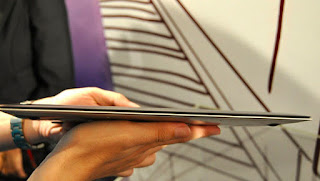Yes, here is one more new technology term! Ultrabooks are the newest evolution of laptops. They were created by Intel, and now big companies like Acer, LG, HP and Asus are investing in the concept. In order to qualify as an Ultrabook, the model must conform to the following: It must be less than 21 mm thick, and most important, it must cost less than US$1,000. (Unfortunately, we already know the price will be higher in Brazil due to the high import taxes here.) According to the manufacturers, it is essential for Ultrabooks to reach a mass audience, and they expect them to become a dominant product in 2013.
The first models released are equipped with Intel Sandy Bridge processors that measure only 32 nanometers. However, with the continued development of technology, it’s expected newer models will be equipped with processors of only 22 nanometers. A nanometer is the unit of measure for the transistor in the processor, and the smaller they get, the greater the possibility of putting more transistors on a single processor, as this increases the performance of the computer. Just to give you an idea of how small these processors are, the flu virus is 100 nanometers in size!
Here are a few more details related to this new concept: Ultrabooks are super thin, use lightweight batteries that last longer - at least five hours - and have a quick start-up, only about seven seconds. Also, the traditional laptop hard drives have been replaced by SSDs, also known as flash memories. Because of this, the Ultrabooks will be strong competitors for netbooks and tablets, since some of them come up with touch screens.
Now you are no doubt wondering: Which is more better to own - the Ultrabook or a tablet? In the previous technology article, we discussed tablets and their features and purpose. A tablet can be seen as a consumer of content - designed to be easy to use, very intuitive, and mobile anywhere, any time.
On the other hand, the Ultrabook is designed as a producer of content - much more powerful than tablets, with the same features as laptops. Additionally, Ultrabooks combine some of the best features of tablets, such as the ease of mobility due to their reduced size and weight.
It is interesting to note that Ultrabook technology isn’t really so new. Perhaps you’ve heard of the Apple MacbookAir, a laptop with the same features as Ultrabooks, released by Apple some years ago. The difference now is that Ultrabooks will be produced by several companies, allowing for the possibility of greater popularity and cheaper prices.
In a nutshell, you can begin thinking which kind of user you are - sometimes a consumer and other times a producer? The good news is you will now have the opportunity to buy the most suitable equipment for your needs, and thus you will take advantage of the best of what technology has to offer.
* Article published on Curitiba in English.

No comments:
Post a Comment